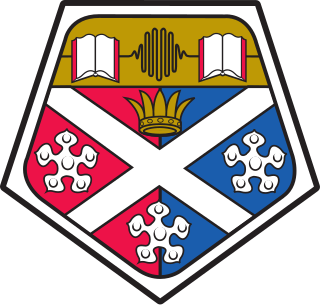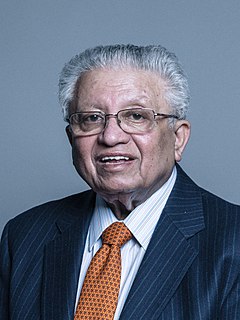
A doctorate or doctor's degree or doctoral degree, is an academic degree awarded by universities, derived from the ancient formalism licentia docendi. In most countries, it is a research degree that qualifies the holder to teach at university level in the degree's field, or to work in a specific profession. There are a number of doctoral degrees; the most common is the Doctor of Philosophy (PhD), which is awarded in many different fields, ranging from the humanities to scientific disciplines.

The University of Strathclyde is a public research university located in Glasgow, Scotland. Founded in 1796 as the Andersonian Institute, it is Glasgow's second-oldest university, with the university receiving its royal charter in 1964 as the first technological university in the United Kingdom. It takes its name from the historic Kingdom of Strathclyde.
Degree abbreviations are used as an alternative way to specify an academic degree instead of spelling out the title in full, such as in reference books such as Who's Who and on business cards. Many degree titles have more than one possible abbreviation, with the abbreviation used varying between different universities. In the UK it is normal not to punctuate abbreviations for degrees with full stops, although this is done at some universities.
Doctor of Science, usually abbreviated Sc.D., D.Sc., S.D., or D.S., is an academic research degree awarded in a number of countries throughout the world. In some countries, "Doctor of Science" is the title used for the standard doctorate in the sciences; elsewhere the Sc.D. is a "higher doctorate" awarded in recognition of a substantial and sustained contribution to scientific knowledge beyond that required for a Doctor of Philosophy (PhD). It may also be awarded as an honorary degree.

Cranfield University is a British postgraduate and research-based public university specialising in science, engineering, technology and management. Cranfield was founded as the College of Aeronautics in 1946. Through the 1950s and 1960s, the development of many aspects of aircraft research and design led to considerable growth and diversification into other areas such as manufacturing and management. In 1967, the Cranfield School of Management was founded. In 1969, the College of Aeronautics became The Cranfield Institute of Technology incorporated by Royal Charter and gained degree awarding powers and became a university in its own right. In 1993, it adopted its current name.
The Doctor of Technology is a degree normally conferred upon candidates after having completed a course of study in technology and a project of lengthy duration in a technologically related field. Like other doctorates, it is usually an academic degree at the highest level; the degree may rank below, alongside, or above the Ph.D. depending on the specifics of the national system within which it is awarded.
The Doctor of Business Administration is a research doctorate awarded on the basis of advanced study, examinations, project work and research in business administration. The D.B.A. is a terminal degree in business administration. Along with the Ph.D. or D.Phil., it represents the highest academic qualification in business administration, and is typically required to gain employment as a full-time, tenure-track university professor or postdoctoral researcher in the field. As with other earned doctorates, individuals with the degree are awarded the academic title doctor, which is often represented via the English honorific "Dr." or the post-nominal letters "DBA" or "PhD".

Bialystok University of Technology is a technical university in Bialystok, Poland.
A terminal degree is a university degree that can signify one of two outcomes. In some cases, it is the highest degree that can be awarded in a specific academic or professional track. In other cases, it is a degree that is awarded when a candidate completes a certain amount of coursework but does not go on to doctoral work. Some students enroll in a terminal Master's program with the goal of preparing to enter a PhD program. For certain professions and research grants it means the lowest degree to be considered qualified.
Doctoral Training Centres are centres for managing the Research Council-funded PhD degrees in the United Kingdom. Typical UK PhD students take three years to complete their doctoral research under the guidance of an academic supervisor or small supervisory team, and tend to be located within an existing research group. By contrast, each DTC involves a UK university in delivering a four-year doctoral training programme to a significant number of PhD students organised into cohorts. Each Centre targets a specific area of research, and also emphasises transferable skills training. The model has been adopted by all seven Research Councils.

Sushanta Kumar Bhattacharyya, Baron Bhattacharyya, was a British-Indian engineer, educator and government advisor. In 1980, he became Professor of Manufacturing Systems at the University of Warwick and founded the Warwick Manufacturing Group. In 2004 he was made a Life Peer and became a member of the House of Lords.

Jönköping University (JU) is a Swedish university college located in the city Jönköping in Småland, Sweden. To study at the university one must also register as a member in Jönköping Student Union which can be done online or on campus.
The Doctor of Engineering, or Engineering Doctorate, is a doctoral degree awarded on the basis of advanced study and research in engineering and applied sciences. In most of the countries it is a terminal research doctorate; in the United Kingdom it can be a higher doctorate. An EngD degree is essentially an engineering PhD with a solid industrial base and an additional taught element.
The Warwick Manufacturing Group is an academic department at the University of Warwick, providing research, education and knowledge transfer in engineering, manufacturing and technology. The group provides taught and research degrees for postgraduate students at the University of Warwick campus in England, and at overseas centres in China, India, Singapore, Malaysia, Cyprus, Russia and Thailand.

The University of Cambridge Department of Engineering is the largest department at the University of Cambridge and one of the leading centres of engineering in the world. The department's aim is to address the world's most pressing challenges with science and technology. To achieve this aim, the department collaborates with other disciplines, institutions, companies and entrepreneurs and adopts an integrated approach to research and teaching.

A Doctor of Philosophy is the highest university degree that is conferred after a course of study by universities in most countries. PhDs are awarded for programs across the whole breadth of academic fields. As an earned research degree, those studying for a PhD are usually required to produce original research that expands the boundaries of knowledge, normally in the form of a thesis or dissertation, and defend their work against experts in the field. The completion of a PhD is often a requirement for employment as a university professor, researcher, or scientist in many fields. Individuals who have earned a Doctor of Philosophy degree may, in many jurisdictions, use the title Doctor or, in non-English-speaking countries, variants such as "Dr. phil." with their name, although the proper etiquette associated with this usage may also be subject to the professional ethics of their own scholarly field, culture, or society. Those who teach at universities or work in academic, educational, or research fields are usually addressed by this title "professionally and socially in a salutation or conversation." Alternatively, holders may use post-nominal letters such as "Ph.D.", "PhD", or "DPhil". It is, however, considered incorrect to use both the title and post-nominals at the same time.

The Faculty of Engineering is one of the four faculties which make up the University of Strathclyde in Glasgow, Scotland. The faculty contains multiple departments offering many different undergraduate and postgraduate courses. These range from BEng, MEng and MSc courses to doctorates throughout the faculty.











